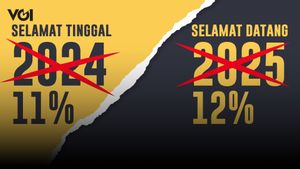JAKARTA - PT Bank Rakyat Indonesia (Persero) Tbk (BBRI) recorded that consumer credit growth in the first quarter of 2023 reached 13.7 percent year on year (yoy). With this double digit growth, BRI managed to reap IDR 173.8 trillion per first quarter of 2023.
It is known that the composition of consumer credit has increased by 50 bps on an annual basis, from 14.2 percent to 14.7 percent. BRI's Director of Consumer Business, Handayani, said that positive consumer credit was also followed by controlled credit quality.
"As of March 2023, the ratio of non-performing loans (NPL) for financing is quite low or 2.01 percent," he said, quoted on Thursday, May 25.
He continued, the data shows the successful fruit of what banks have done, including Bank BRI, in optimizing services and strengthening retail banking capacity. Handayani said, BRI will further strengthen retail banking capabilities in 2023.
One of its strategies is to continue to improve business processes engineering in the form of the implementation of the Consumer Loan Factory (CLF). BRI also continues to encourage the digitization of business processes, such as transactions through the BRIPOT and BRImo applications.
"To further optimize performance, we will provide services to customers through various channels. Then we continue to open API connection cooperation with various parties. As a result, credit distribution growth can be motivated according to the target and customers are more comfortable in transactions," said Handayani.
另请阅读:
He added that the prospect of this year's consumer credit is fairly good because inflation tends to decline. The Rupiah exchange rate continues to experience appreciation and is stable below Rp. 15,000.
The Central Statistics Agency (BPS) noted that in April 2023, inflation in Indonesia was 4.33 percent on an annual basis. This figure continues the downward trend since last year, after touching 5.95 percent in September 2022.
The impact of the continued rupiah shows an appreciation trend, namely encouraging Bank Indonesia to relax monetary policy, either holding back or even lowering the benchmark interest rate in the second semester/2023.
"That way, consumer credit growth can be further increased," he concluded.
The English, Chinese, Japanese, Arabic, and French versions are automatically generated by the AI. So there may still be inaccuracies in translating, please always see Indonesian as our main language. (system supported by DigitalSiber.id)
















